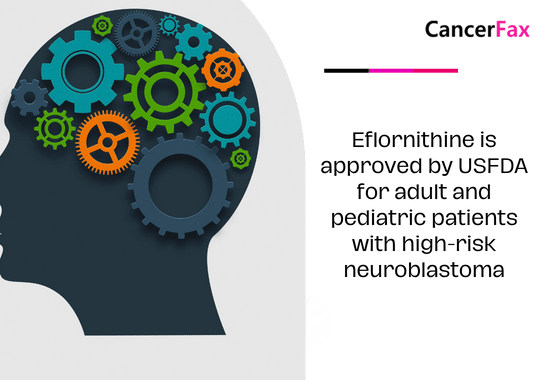The FDA approved eflornithine (IWILFIN, USWM, LLC) on December 13, 2023, to lower the risk of relapse in adults and children with high-risk neuroblastoma (HRNB) who had a partial response to previous multiagent, multimodality therapy, such as anti-GD2 immunotherapy.
This marks the initial FDA approval of a treatment designed to lower the likelihood of relapse in juvenile patients with HRNB.
The effectiveness was assessed in a trial that compared results from Study 3b (the experimental group) with Study ANBL0032 (the external control group generated from a clinical trial). Study 3b (NCT02395666) was a multi-center trial that was open label and non-randomized, consisting of two cohorts. 105 eligible patients with high-risk neuroblastoma from one group (Stratum 1) were given eflornithine orally, twice daily at a dosage determined by body surface area (BSA) until disease progression, unacceptable toxicity, or for a maximum of 2 years. Study 3b was planned in advance to compare outcomes with the historical benchmark event free survival (EFS) rate from Study ANBL0032 as reported in published literature.
Study ANBL0032 was a multi-center, open-label, randomized trial that compared dinutuximab, granulocyte-macrophage colony-stimulating factor, interleukin-2, and cis-retinoic acid to cis-retinoic acid alone in pediatric patients with high-risk neuroblastoma. The external control arm was based on data from 1,241 patients in the experimental arm.
Patients who met the criteria for the comparison between Study 3b and ANBL0032 and had full data for certain clinical covariates were paired in a 3:1 ratio based on their propensity scores. The primary analysis included 90 patients treated with IWILFIN and 270 control patients from Study ANBL0032.
The primary efficacy measure was event-free survival (EFS), which encompassed disease progression, recurrence, secondary malignancy, or death from any cause. Another efficacy metric was overall survival (OS), which was defined as death from any cause. The EFS hazard ratio (HR) in the primary analysis was 0.48 with a 95% confidence interval (CI) of 0.27 to 0.85. The OS HR was 0.32 with a 95% CI of 0.15 to 0.70. Because of the uncertainty in estimating the treatment effect that comes with an externally controlled research design, extra analyses were done on subpopulations or using different statistical methods. The EFS HR varied between 0.43 (95% CI: 0.23, 0.79) and 0.59 (95% CI: 0.28, 1.27), while the OS HR ranged from 0.29 (95% CI: 0.11, 0.72) to 0.45 (95% CI: 0.21, 0.98).
In Study 3b, the most common side effects (≥5%), which also included lab abnormalities, were stuffy nose, diarrhea, cough, sinusitis, pneumonia, upper respiratory tract infection, conjunctivitis, vomiting, fever, allergic rhinitis, lower neutrophils, higher ALT and AST, hearing loss, skin infection, and urinary tract infection.

Targeting FGFR4 and CD276 with CAR T-cells demonstrates a strong antitumor impact against children rhabdomyosarcoma
Chimeric antigen receptor (CAR) T-cells that specifically target Fibroblast Growth Factor Receptor 4 (FGFR4), a surface tyrosine receptor that is extensively expressed in rhabdomyosarcoma (RMS), are now undergoing clinical research. However, the effectiveness of these CAR T-cells may be hindered by tumor heterogeneity and inadequate activation. In this study, we present a method to enhance the co-stimulatory and targeting characteristics of a FGFR4 CAR through an optimization process. We substituted the hinge and transmembrane domain of CD8 as well as the 4-1BB co-stimulatory domain with the corresponding domains of CD28. The CARs produced exhibit heightened anti-tumor efficacy in multiple RMS xenograft models, with the exception of the RMS559 cell line, which is known for its aggressive nature.

